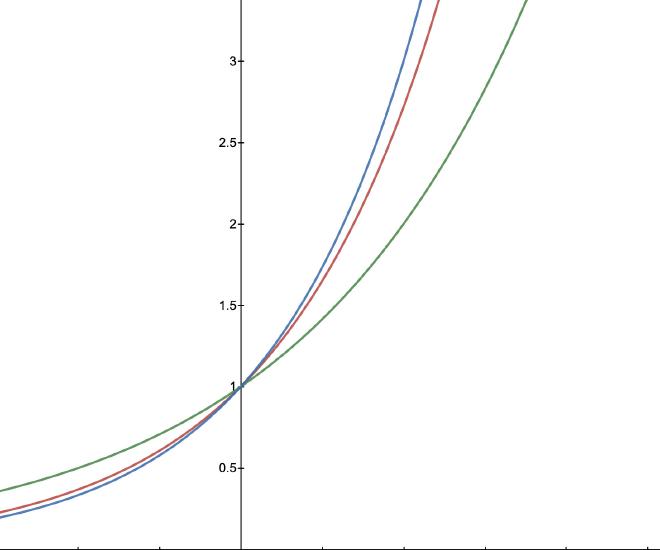section 6.2
Table of Contents
Exponential Functions
An exponential function is a function in which the variable is in the exponent. $y = a^x$ where $a > 0$. Remember that exponentiation is repeated multiplication. That is,
$a^n = a\cdot a \cdot a \cdot \cdots \cdot a$ where $a$ is multiplied $n$ times.
Exploring exponential graphs #
Play around with this Geogebra activity - move the sliders on the right (they slide up and down) to change the values of the function and see what changes those make to the graph.
https://www.geogebra.org/m/YK6pcUsB
Recall: Rules of Exponents #
If $a > 0$ and $a \ne 1$:
- $a^{x+y} = a^x a^y$
- $a^{x-y} = \frac{a^x}{a^y}$
- $(a^x)^y = a^{xy}$
- $(ab)^x = a^x b^x$
Calculus facts for exponential functions: #
If $a > 0$ and $a \ne 1$
- If $a >1$, then: a. $f(x) = a^x$ is an increasing function. b. $\displaystyle \lim_{x\to -\infty} a^x = 0$ c. $\displaystyle \lim_{x \to \infty} a^x = \infty$
- If $0 < a < 1$, then: a. $f(x) = a^{x}$ is a decreasing function. b. $\displaystyle \lim_{x\to -\infty} a^x = \infty$ c. $\displaystyle \lim_{x \to \infty} a^x = 0$
Example #
Find the limit $\displaystyle \lim_{x\to \infty} 3^{-x} + 1$
Solution:
Click to reveal the answer.
$\begin{align*} \lim_{x\to \infty} 3^{-x} + 1 &= \lim_{x\to \infty} \left(\frac13\right)^x + 1 \\ &= 0 + 1 \\ &= 1 \end{align*}$The Natural Exponential Function #

Any exponential function $f(x) =a^x$ has the point $f(0) = 1$. However, it becomes very interesting to consider the particular exponential function that has the property that the slope at $(0,1)$ is itself 1. That is, $f’(0) = 1$ as well. We define this function to be the natural exponential function and call its base $e$:
Define $e^x$ to be the natural exponential function. It has the following remarkable property:
$$ \dfrac{d}{dx} e^x = e^x $$
… it is its own derivative.
Pairing with the chain rule:
$$ \frac{d}{dx} e^u = e^u \dfrac{du}{dx} $$
Example #
Find the derivative of $y = e^{2x} \cos x$
Integration of $e^x$ #
Since $\dfrac{d}{dx} e^x = e^x$, that gives rise to its integral: $$ \int e^x \, dx = e^x + C $$
Example #
Evaluate $\int x^2 e^{x^3} \, dx$